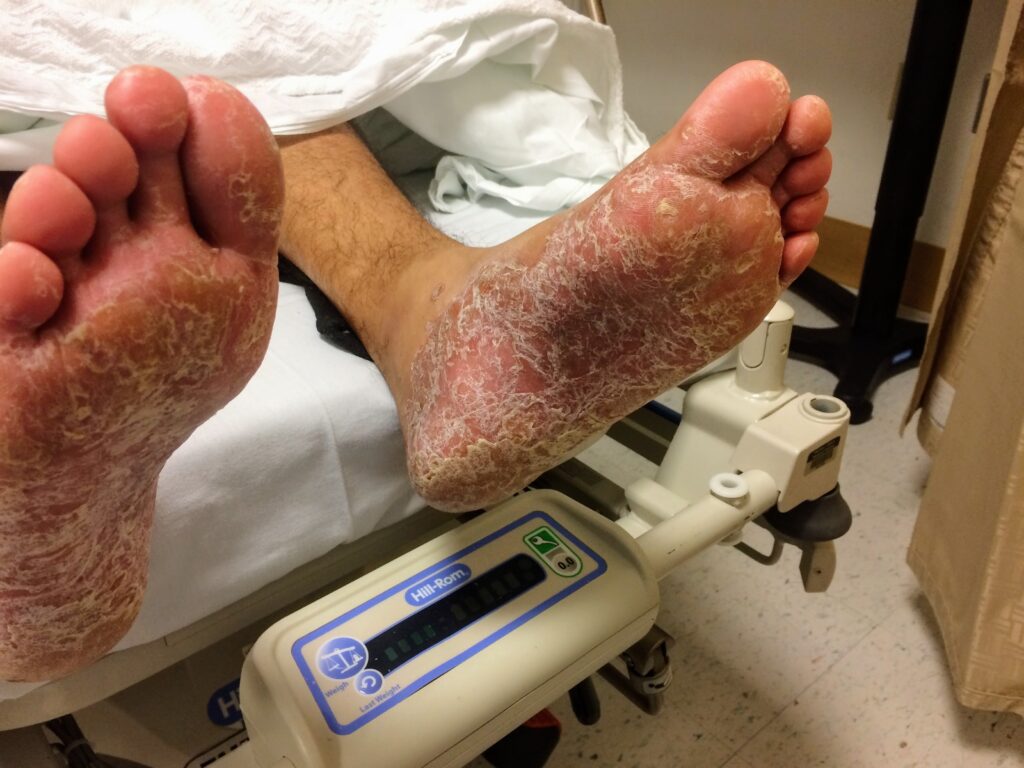Neurosyphilis is a severe manifestation of Treponema pallidum infection, occurring when syphilis invades the central nervous system (CNS). Although primarily associated with late-stage syphilis, it can develop at any stage, causing neurological and psychiatric symptoms. If left untreated, neurosyphilis can lead to permanent brain and spinal cord damage, significantly impacting cognitive and motor functions.
This article provides a comprehensive overview of neurosyphilis, including its causes, symptoms, diagnosis, and treatment options.

Pathophysiology
it occurs when Treponema pallidum crosses the blood-brain barrier, leading to meningeal inflammation, vascular damage, and neuronal degeneration. The progression of the disease can be classified into distinct pathological stages.
Types
Neurosyphilis is classified based on clinical presentation and disease progression.
1. Asymptomatic Neurosyphilis
- No noticeable symptoms, but positive cerebrospinal fluid (CSF) findings.
- Common in the early stages of syphilis.
2. Meningeal Neurosyphilis
- Develops within months to years after infection.
- Symptoms include severe headaches, stiff neck, nausea, and cranial nerve involvement.
3. Meningovascular Neurosyphilis
- Characterized by inflammation of blood vessels (vasculitis) in the brain and spinal cord.
- Leads to strokes, limb weakness, and cognitive decline.
4. Parenchymal Neurosyphilis (General Paresis & Tabes Dorsalis)
- Occurs decades after initial infection if untreated.
- General paresis: Progressive dementia, personality changes, and psychosis.
- Tabes dorsalis: Loss of coordination, severe pain, and sensory deficits due to spinal cord damage.
Causes and Risk Factors
Neurosyphilis is caused by the bacterium Treponema pallidum, which spreads through sexual contact, congenital transmission, or untreated syphilis.
Risk Factors
- Untreated or inadequately treated syphilis.
- Immunosuppression (HIV/AIDS) – Increases risk of rapid progression.
- High-risk sexual behavior – Multiple partners and lack of protection.
- Intravenous drug use – Associated with co-infections that worsen syphilis outcomes.
Symptoms
The clinical symptoms vary depending on the stage and form of neurosyphilis.
1. Neurological Symptoms
- Chronic headaches and dizziness.
- Cranial nerve palsies – Vision impairment, facial paralysis, hearing loss.
- Stroke-like episodes – Weakness, paralysis, and speech difficulties.
2. Psychiatric Symptoms
- Memory loss and cognitive impairment.
- Depression, psychosis, and personality changes.
3. Sensory and Motor Dysfunction
- Loss of reflexes and coordination (Ataxia).
- Severe lightning pain in limbs (Tabes dorsalis).
Diagnosis
Early and accurate diagnosis is critical to prevent irreversible damage.
1. Blood Tests
- Treponemal Tests (FTA-ABS, TPPA) – Confirm syphilis infection.
- Nontreponemal Tests (RPR, VDRL) – Detect active infection.
2. Cerebrospinal Fluid (CSF) Analysis
- CSF-VDRL – Highly specific for neurosyphilis.
- Elevated white blood cells (WBCs) and protein indicate CNS inflammation.
3. Neuroimaging
- MRI and CT scans – Identify brain abnormalities, strokes, or spinal cord degeneration.
Treatment
Penicillin remains the gold-standard treatment for neurosyphilis.
1. Antibiotic Therapy
- Intravenous Penicillin G (IV, 10–14 days) – Eliminates Treponema pallidum from the CNS.
- Alternative: Ceftriaxone (if penicillin allergy present).
2. Adjunctive Therapy
- Corticosteroids – Reduce inflammation and prevent Jarisch-Herxheimer reaction (a worsening of symptoms after treatment).
- Symptomatic management – Pain relievers, antipsychotics, and physical therapy for rehabilitation.
Complications
If left untreated, neurosyphilis can result in:
✅ Permanent cognitive impairment and dementia.
✅ Blindness, deafness, and paralysis.
✅ Chronic pain and sensory loss.
✅ Increased stroke risk due to vascular inflammation.
Prevention of Neurosyphilis
1. Early Detection and Treatment
- Routine syphilis screening for high-risk individuals.
- Timely antibiotic treatment to prevent CNS involvement.
2. Safer Sexual Practices
- Consistent condom use reduces syphilis transmission.
- Regular STI testing for sexually active individuals.
3. Monitoring High-Risk Populations
- HIV-positive individuals require frequent neurological evaluations.
- Pregnant women should undergo prenatal syphilis screening to prevent congenital neurosyphilis.
Neurosyphilis is a serious but preventable complication of untreated syphilis. With early diagnosis and appropriate antibiotic therapy, long-term neurological damage can be avoided. Routine screening, safer sexual practices, and awareness are essential in reducing the burden of neurosyphilis globally.